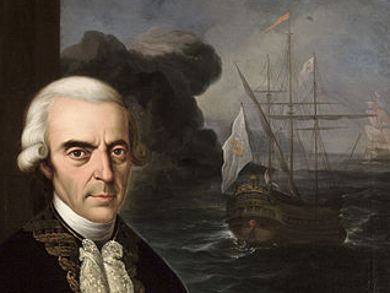Antonio de Ulloa was born in Seville, Spain, on January 12, 1716. The explorer, scientist, author, naval, and colonial officer is credited with the first scientific description of the precious metal platinum.
De Ulloa was educated in both the social and physical sciences. His father, Bernardo de Ulloa, was an economist, and his tutor, Fray Vázquez Tinoco, was a mathematics instructor. In 1733, Antonio de Ulloa was admitted to the “Guardias Marinas”, a navy corps devoted to the study of mathematics, astronomy, and navigation.
De Ulloa took part in the first major international scientific expedition, the Spanish-French Geodesic Mission. The expedition’s aim was to measure the deviation of the Earth from a perfect sphere by measuring a degree of meridian arc at the equator. The measurements were to be performed in a Spanish province located around Quito, in today’s Ecuador. The expedition left France in 1735, and reached Quito in June 1736. During their time there, De Ulloa and his Spanish fellow Jorge Juan discovered platinum in the area. It commonly occured in the region’s gold mines and was considered an impurity. De Ulloa wrote the first scientific description of the metal.
On his journey back to Spain, de Ulloa was captured in the War of the Jenkins Ear between Spain and England by the English. As his scientific reputation had preceeded him, he was treated well, able to meet with many distinguished scientists, and was even made Fellow of the Royal Society. He returned to Spain in 1746. There, he was again appointed to scientific work, and consulted on the founding of a natural history museum (said to be the first of its kind) and the observatory of Cádiz, Spain.
In 1757, de Ulloa switched to colonial service and was made governor of Huancavelica in Peru and superintendent of its quicksilver mines, a position he was hesitant to accept. Rampant fraud and corruption made it virtually impossible for him to control the mines. His request to be relieved from this post was granted in 1764.
The Spanish King then appointed de Ulloa Governor of Louisiana, USA, which had at the time just passed from French into Spanish rule. De Ulloa arrived in New Orleans in 1766. In 1768, the pro-French population (Creole and German settlers) rebelled and drove him from the country. His successor, Alejandro O’Reilly was able to crush the rebellion and establish Spanish rule over the territory. Antonia de Ulloa returned to Spain, where he continued to serve as a naval officer. He died at Isla de Leon, Cádiz, in 1795.
Antonio de Ulloa is the answer to Guess the Chemist (49).
Sources
- Antonio de Ulloa,
Arthur P. Whitaker,
The Hispanic American Historical Review 1935, 15, 155-194.
DOI: 10.2307/2506293
Selected Publications
- A Voyage to South America,
Antonio de Ulloa,
Cambridge University Press, 2001.
ISBN: 9781108031684




